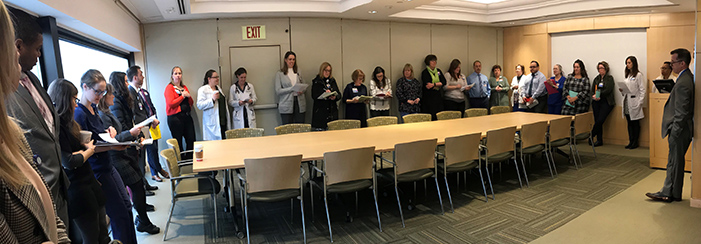
Since December of 2018, Brigham and Women’s Faulkner Hospital has been conducting Daily Safety Huddles each weekday at 9:30 am, bringing together clinical and operational leaders for a brief, 15-minute meeting to identify obstacles to managing patient care and flow in a safe, timely manner. In just a few short months, these meetings have become an integral part of our daily operations.
The Daily Safety Huddle, run by Chief Medical Officer and Vice President of Medical Affairs Dr. Peggy Duggan and Chief Nursing Officer and Vice President of Patient Care Services Cori Loescher, MM, BSN, RN, NEA-BC, is designed to improve several key things: situational awareness, patient safety and quality, employee satisfaction/engagement, teamwork, communication and collaboration. It’s also intended to reduce barriers to care.
“We will be looking at several outcomes when we think about the effectiveness of the Daily Safety Huddle,” say Loescher. “We want to see our percentage of early discharges go up as well as the number of transfers from Brigham and Women’s Hospital to BWFH and our hand hygiene rates. We also hope to reduce 30-day readmission rates, Code Helps, catheter-associated urinary tract infection (CAUTI) and central line-associated blood stream infection (CLABSI) rates and falls with injury. All of these are areas that require constant diligence and the Daily Safety Huddle is a great opportunity to keep them at the forefront of everyone’s mind.”
So far, the results have been promising. In the first two months, the group raised 120 separate issues. Forty-three percent of those issues have been closed within one day. “It’s wonderful to see how willing everyone is to participate,” says Dr. Duggan. “In fact, nearly every department has raised at lease one issue so far.”
The most common issues that arise are patient flow issues. Other issues that the group has addressed include deflated CPR masks on code carts, bed shortages and more.
Feedback from participants is also positive. Most say they find the brief 15-minute meeting each day to be very helpful and share the information they gather with their staff. “We really do think that the Daily Safety Huddle is proving to be valuable,” says Duggan. “I look forward to seeing its impact on our key outcome measures as we move forward.”
Looking for more news from BWFH? Go to News to find articles about health, updates to our programs and services and stories about staff and patients.
Go to News